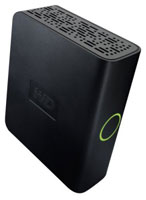This post could probably be considered to be the second part of my very first post on this blog entitled Freeing your digital media in which I talked about the DLNA standards and how they allowed you to store all your media on a NAS device and stream it around your house over your network.
I'd been considering this more seriously and realised that a large proportion of my MP3 collection were low bitrate poor quality rips which just sound awful played though a half decent hi-fi.
 Storage space is only getting cheaper and today you can pick up a 500GB external hard disk, enough for 700 uncompressed albums, for less than £80; the Western Digital My Book series
Storage space is only getting cheaper and today you can pick up a 500GB external hard disk, enough for 700 uncompressed albums, for less than £80; the Western Digital My Book series proving to be a popular choice. There really is no reason why, with this much space, we should be sticking to lossy compression formats for our music archiving. So, with that in mind, what are the options?
The main contenders
- WAV
- Microsoft's uncompressed audio format
- AIFF
- Apple's uncompressed audio format
- WMA Lossless
- Microsoft's lossless audio compression format
- Apple Lossless
- Apple's lossless audio compression format
- FLAC
- Open source lossless audio compression format - now part of the Xiph.org Foundation, originally developed by Josh Coalson
- Monkey's Audio
- A lossless audio compression format developed by Matt Ashland
- Shorten
- An old open source lossless audio compression format developed by Tony Robinson at SoftSound
Hydrogen Audio have prepared a good comparison table of lossless formats. Uncompressed 44.1kHz 16bit audio uses up about 10MB of space per minute. The lossless compression formats listed above all reduce file sizes to about 6MB per minute. Not bad but compared to the 1 - 2MB per minute we're used to with lossy formats this still seems like a lot. My justification for this space usage is that I want the convenience of being able to carry 700 albums around with me and I've paid for the CDs so i might as well be listening to them in full CD quality.
My criteria for a format were; open source, good compression and good hardware and software support. This already removes all the Microsoft and Apple options and Monkey's Audio. Shorten is old and has poor support so the natural choice is FLAC which, being part of the Xiph.org Foundation, has a large developer base behind it and support in all the major software and hardware music players albeit via new firmware in some cases. Not to mention that it's now packaged with arguably the best CD ripper, Exact Audio Copy.
A quick download, set up and a few rips later and I'm rather astounded by the results. To my ears the FLAC files actually sound better than playing the original CD through the same system, delivering a far more punchy and detailed sound. I have to admit I wasn't expecting this and I'm assuming it's down to my CD-ROM reading the audio data poorly when playing the CD directly.


No comments:
Post a Comment